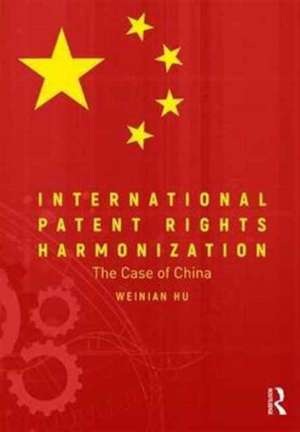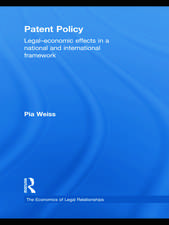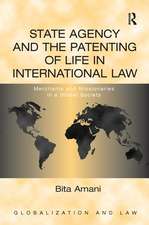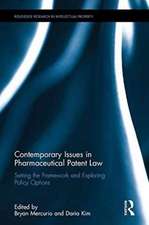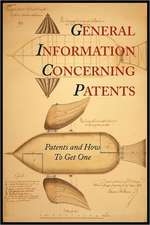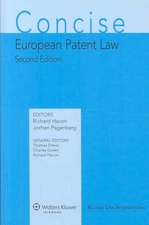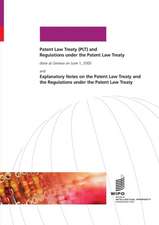International Patent Rights Harmonisation: The Case of China
Autor Weinian Huen Limba Engleză Hardback – 9 mai 2017
Global trade policy makers, IP professionals and businesses will benefit from the insights presented by the chapters as they will help them to appreciate the achievements and the controversies pursuant to China’s efforts in patent protection. While serving as a useful case study for countries seeking to leverage patent protection as a driver for economic development, the book will equally facilitate Chinese legislature to reflect on its patent legislation development, specifically on legislative policy choices.
An additional analytical strength of the volume is that it compares the Chinese patent legislation with the American Invents Act and the European Patent Convention. It discovers the differences between the three patent legislations by using the minimum patent protection standards set down by the TRIPS Agreement as the benchmark. The results of the comparisons suggest that China has successfully harmonised its patent legislation with the global patent protection system, and often opts for higher patent protection standards. The book also considers whether China could learn lessons from Japan and India in their respective patent legislation and policy choices.
With China undertaking a fourth patent law amendment, the provisions contained in the second draft of the Patent Law 2015, which was published in December 2015, are included in the analysis.
| Toate formatele și edițiile | Preț | Express |
|---|---|---|
| Paperback (1) | 260.33 lei 43-57 zile | |
| Taylor & Francis – 20 dec 2019 | 260.33 lei 43-57 zile | |
| Hardback (1) | 767.88 lei 43-57 zile | |
| Taylor & Francis – 9 mai 2017 | 767.88 lei 43-57 zile |
Preț: 767.88 lei
Preț vechi: 1029.57 lei
-25% Nou
Puncte Express: 1152
Preț estimativ în valută:
146.93€ • 153.82$ • 121.58£
146.93€ • 153.82$ • 121.58£
Carte tipărită la comandă
Livrare economică 07-21 aprilie
Preluare comenzi: 021 569.72.76
Specificații
ISBN-13: 9781472481382
ISBN-10: 1472481380
Pagini: 256
Ilustrații: 3
Dimensiuni: 174 x 246 x 21 mm
Greutate: 0.66 kg
Ediția:1
Editura: Taylor & Francis
Colecția Routledge
Locul publicării:Oxford, United Kingdom
ISBN-10: 1472481380
Pagini: 256
Ilustrații: 3
Dimensiuni: 174 x 246 x 21 mm
Greutate: 0.66 kg
Ediția:1
Editura: Taylor & Francis
Colecția Routledge
Locul publicării:Oxford, United Kingdom
Cuprins
Table of Contents
Introduction
Chapter 1: The process of international patent rights harmonisation
Chapter 2: Assessing the progress of international patent rights harmonisation
Chapter 3: Judicial system in China
Chapter 4 Intellectual property rights protection in China: legislation and enforcement
Chapter 5 the Evolution of patent legislation in China
Chapter 6 Patent policy and legislation: Japan vs. China
Chapter 7 Patent policy and legislation: India vs. China
Chapter 8: International patent rights harmonisation – the case of China
Conclusion
Bibliography
Introduction
Chapter 1: The process of international patent rights harmonisation
Chapter 2: Assessing the progress of international patent rights harmonisation
Chapter 3: Judicial system in China
Chapter 4 Intellectual property rights protection in China: legislation and enforcement
Chapter 5 the Evolution of patent legislation in China
Chapter 6 Patent policy and legislation: Japan vs. China
Chapter 7 Patent policy and legislation: India vs. China
Chapter 8: International patent rights harmonisation – the case of China
Conclusion
Bibliography
Notă biografică
Weinian Hu is a research fellow at the Centre for Private and Economic Law, Vrije Universiteit Brussel, Belgium. A Chinese national from Shanghai, Dr Hu’s career has bridged Asia and Europe at the intersection of academia, diplomacy and industry. In addition to her academic pursuits in international trade law in general, and patent law and intellectual property rights protection in particular, she acquired extensive international experience by working with a global bank in China, an inter-governmental organisation in Singapore, a non-governmental organisation in Malaysia and a global-leading public affairs agency in Belgium. She also served as consultant for the European Union for the Asia-Europe Meeting (ASEM), the multilateral political dialogue process between the Asian and the European regions. Dr Hu holds degrees from Chinese, British and Belgian universities.
Recenzii
Weinian Hu’s book offers an up-to-date introduction to Chinese patent law at the light of the global harmonization process. The pan-Asian perspective and the insights on local features make the book a valuable source for those who want to understand Chinese patent law in a broader evolving context. Alain Strowel, Professor UCLouvain, Université Saint-Louis, Munich Intellectual Property Centre.
Descriere
With reference to China, this book examines the course of international patent rights harmonisation, its characteristics as well as impediments. It evaluates China’s patent law development over the course of the last three decades by drawing on the most up to date Chinese language sources. In the process, the volume focuses on China’s patent legislation, its achievements and weaknesses, as well as the intrinsic limitations, especially as far as enforcement is concerned. Global trade policy makers, IP professionals as well as businesses will benefit from the insights presented by the chapters in order to appreciate the achievements and the controversies pursuant to China’s efforts in patent protection. The book also considers whether China could learn lessons from Japan and India for their respective patent legislation and policy choices, of which it will facilitate Chinese legislature to reflect on its patent legislation development.
